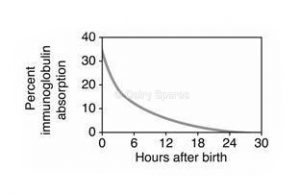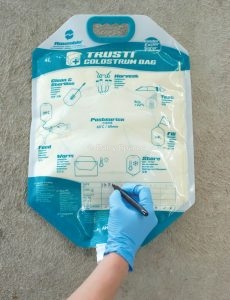| Part No. | Description. | Size/Suitable For. | MOQ |  |
 |
|---|---|---|---|---|---|
| ANT42C | Trusti Colostrum Bag Cap c/w Hosetail Only | - | 1 |
 Trusti Colostrum Bag
Trusti Colostrum BagIncorporating the award winning, premium Trusti Tuber calf tube feeder
Large spout for easy filling and cleaning
Transparent side – see the colostrum contents and the colostrum level reduce during feeding
Reusable – due to durability and easy to clean design, the Trusti colostrum bag is the only colostrum bag designed to be reused. (Number of uses dependant on cleaning and care of bag)
Comfortable handle
Pasteurisation friendly
Large capacity – four litres freezes flat
Quick thawing
 Calves require 10% of their bodyweight of high quality colostrum within a few hours of birth. For example a 40kg calf = 4litres within 4 hours (within 1 hour is even better – see graph). A calf is born devoid of antibodies, leaving it susceptible to infection. Within the first few hours of life, the calf can absorb antibodies into the blood stream where they will provide immunity until the calfs own immune system develops.
Calves require 10% of their bodyweight of high quality colostrum within a few hours of birth. For example a 40kg calf = 4litres within 4 hours (within 1 hour is even better – see graph). A calf is born devoid of antibodies, leaving it susceptible to infection. Within the first few hours of life, the calf can absorb antibodies into the blood stream where they will provide immunity until the calfs own immune system develops.
The quality of colostrum relates to the level of antibodies and also the level of bacterial contamination. The antibody level should be greater than 50g per litre (or 22% on the brix refractometer) to provide enough antibodies for the calf. Bacterial contamination should be as low as possible to allow the calf maximum utilisation and absorption of the antibodies.
A calf that receives sufficient colostrum is healthier and more productive for life compared to a calf that does not receive sufficient colostrum.
Bags provide the best method to store quality colostrum.

Bags allow colostrum to be pasteurised (optional), frozen (up to one year or refrigerated for 2 days) and quickly thawed to feed a calf within the critical time frame. The tube or teat can be applied directly to the bag to allow most efficient and hygienic feeding. Colostrum can be stored in bottles but this results in a very slow thawing process where the thawing time is longer than the critical time to feed the calf and normally requires the transfer of colostrum to another feeding vessel.
Recommended pasteurising is 60ºC for 60 minutes and should be carefully controlled. Bags are the best option for safely pasteurising colostrum for preservation of antibodies. Pasteurisation kills 99% of bacteria in cases of unhygienic harvesting or cows with Johnes disease etc.
Due to the high surface area and efficient heat transfer, bags are excellent for quick thawing so feed the newborn calf as soon after birth as possible. It is optimum to feed the calf at body temperature of 39ºC which can easily be undertaken in our quick thaw tub without risk of overheating and damaging antibodies.